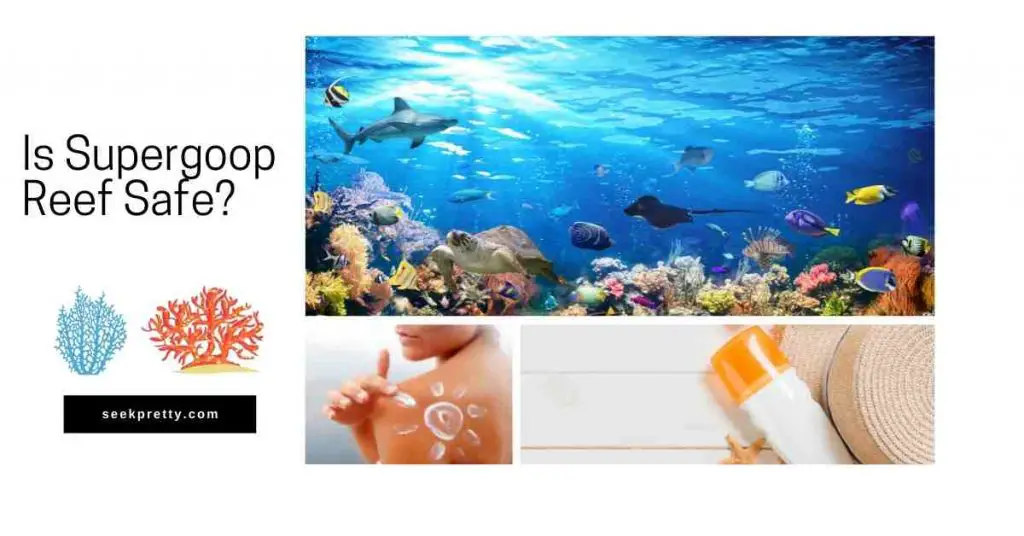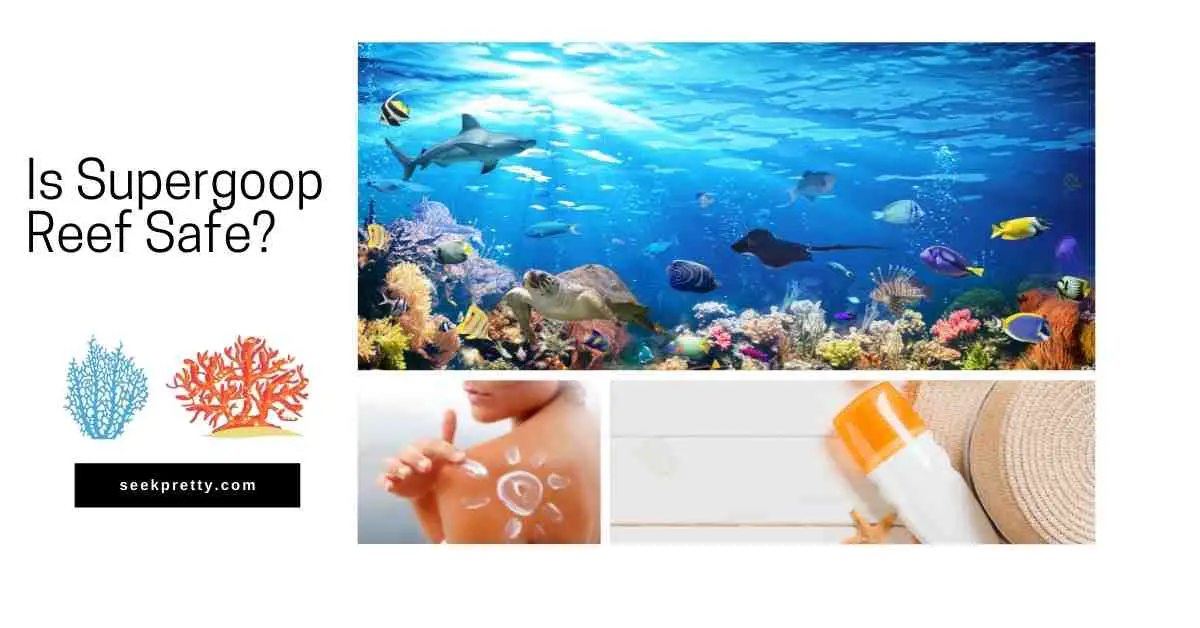Supergoop, as far as reef-safe SPF goes, offer one mineral sunscreen that the brand claim in their marketing is reef safe. This clean reef safe sunscreen is the brands Supergoop mineral sheerscreen. However the brand don’t appear to use ingredients that aren’t reef safe until you look at their non-mineral based sun creams and lotions.

If you look a little closer at supergoops product ingredient lists and marketing it appears that most of their sun protection products are reef-safe and they are working to be “the leader in developing feel-good clean sunscreen, and we were the first to create an SPF without oxybenzone. Today, we’re committed to ensuring that every product is reef-safe, cruelty-free, and in the most environmentally-friendly packaging possible”
However, the brands sun care products that aren’t mineral based mostly contain Avobenzone, which is also a petrochemical. According to biological diversity Avobenzone is an “endocrine disruptor which means it can lower a coral reefs resistence against rising ocean temperatures that are destroying reefs around the world as global warming increases.
If you want the best chance of your Supergoop cream being reef-safe, choose a product in the brands mineral range and look closely at the ingredients for each individual product. We have listed some of the most popular sunscreens from Supergoop and whether or not they contain these reef unfriendly ingredients or not.
Read on to find out more about reef safe ingredients, ingredients that aren’t reef safe and the Supergoop no list.
Click image above to view Supergoop mineral sunscreen on Amazon
Contents
How do you know if a sunscreen is reef safe | Reef safe claims are often misleading
There is no regulation for a product to be classed as reef safe so brands that claim to be reef safe may still contain ingredients that are damaging to a reef. If you really want to know whether you can apply a sunscreen on your skin and safely swim in a reef without risking damaging the reef, you need to look a little closer at the ingredients list.
Oxybenzone and Octinoxate are 2 ingredients often used in Sunscreens that are known to be damaging to the reef but there are a number of other ingredients you should avoid, which we will list below.
Supergoop do claim to use Octinoxate in their Healthy Glow Sunless Tan SPF 40 cream, but having removed this ingredient from products they used to sell, they are working to remove it completely from this cream as soon as possible.
A lot of sunscreen brands also use Avobenzone, Homosalate and Octocrylene which are also seen by the Hawaii tourism board as being harmful to coral reefs.
Ingredients that aren’t reef safe
- Octocrylene – The center for biological diversity write about how this ingredient can cause brain deformities in fish lava and cause reproductive toxicity. It may also have a bleaching effect on corals.
- 4-methylbenzylidene camphor – 4-methylbenzylidene camphor is a synthetic compound used as an oil-soluble sunscreen agent and UV absorber. 4-methylbenzylidene camphor isn’t reef safe because it’s toxic to marine life. It’s commonly used in sunscreen, but it can also be found in some insect repellents and lotions. When this chemical gets into the water, it can cause coral bleaching and harm fish and other marine life.
- Homosalate – This chemical doesn’t break down easily and traces of this chemical have been found on sea life and corals. Exactly what affect it has on them isn’t clear yet but it seems like it’s better to avoid this ingredient if you want to be completely reef safe.
- Oxybenzone – is one of the worst ingredients for coral reefs so make sure to avoid it if you want to be sure your sun screen is reef friendly.
- Octinoxate – Octinoxate and Oxybenzone were both banned in Hawaii in 2018. These are 2 ingredients that are recognised most widely as not being reef safe. Octinoxate is dangerous for coral reefs because it is an endocrine disruptor. This means that it can interfere with the hormones of marine life, including coral reefs. Octinoxate has been shown to cause reproductive problems in fish and other marine life. It is also believed to contribute to the bleaching of coral reefs.
- PABA
- Parabens
- Triclosan
- Nanoparticles – zinc or titanium. If these ingredients are micro sized or not nano-sized then they are safe to use.
- Avobenzone – Avobenzone stops coral from being able to protect themselves from rising ocean temperatures.
- Octisalate – This is believed to be an environmental toxin and even though there is limited research some organisations have restricted it’s use.
Comparing Supergoop products | Are they reef safe or not?
| Product name | Does it Contain Avobenzone, Homosalate or Octocrylene | Mineral based? | Non reef-safe ingredients | Reef safe |
| Glowscreen | Yes | No | Avobenzone, Octocrylene, Octisalate | No |
| Mineral Sheerscreen | No | Yes | None. The zine oxide is not a nano particle so should be reef safe. | Yes |
| Unseen Sunscreen | Yes | No | Avobenzone, homosalate, Octisalate and Octocrylene. | No |
| Supergoop play everyday lotion | yes | no | Avobenzone, homosalate, octisalate, octocrylene. | no |
| Play 100% mineral body mist | no | yes | Zinc oxide and titanium dioxide are potentially nanoparticles and could be unsafe | no |
| Cloud 9 Mineral sun balm | no | yes | Zinc oxide and titanium dioxide. It isn’t clear whether they are nano-particles, but most likely they are | no |
| Poof 100% mineral part powder. | no | no | Zinc oxide | no |
The Supergoop NO list – ingredients the brand never uses
Supergoop have written an extensive list of ingredients they don’t use in their products. We aren’t going to list them all here but instead, look to see if we can find any that could be damaging to a reef.
Is Supergoop glow screen really reef safe?
Supergoop glow screen isn’t reef safe because it contains Avobenzone, Octocrylene and Octisalate which both Save the reef and the HEL chemical pollutant list claim aren’t safe for use in the ocean near to a Coral reef.
How reef friendly is Supergoop sunscreen
Supergoop aren’t a brand that offer 100% clean and reef safe products, even though they might claim that they do some of their products contain questionable ingredients and ingredients that are recognised by some organisations as being unsafe for use in the ocean near a coral reef.
Supergloop Mineral Sheer screen is the only product from Supergoop that I could find that appears to be reef safe. Most of the non-mineral based sun protection formulas contain Avobenzone, homosalate, octisalate and octocrylene. Whereas the mineral suncream formulas contain zinc oxide and titanium dioxide.
These ingredients are only listed as being – non-nano particles ( better for a coral reef ) in the Sheer Sunscreen formula so it isn’t clear whether they are nano particles in the other formulas but we presume they will be. Protecting Coral reefs and sea life is important so be sure to try and use a reef safe sunscreen if you’ll be swimming or bathing near a reef.



